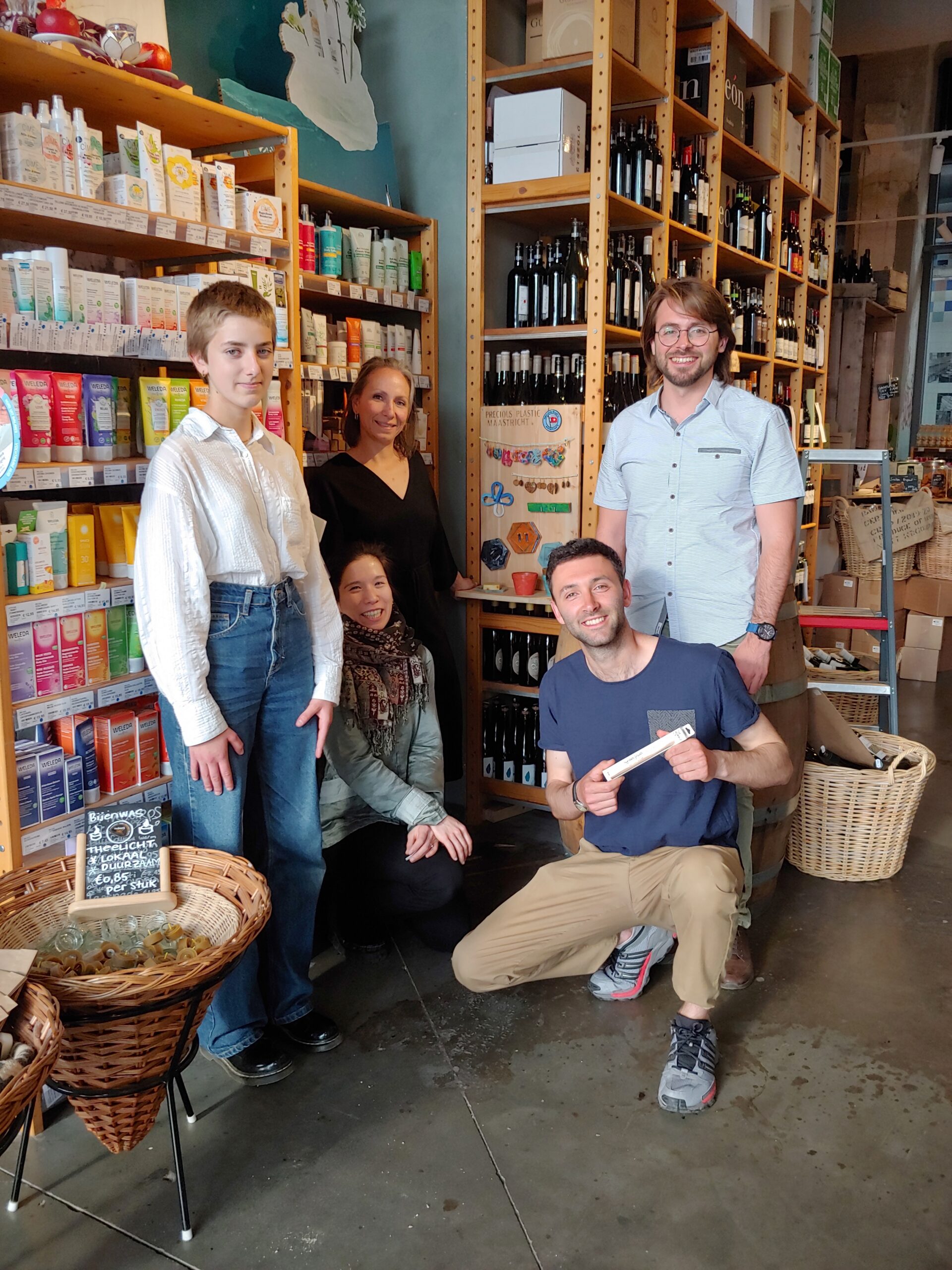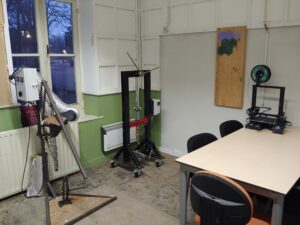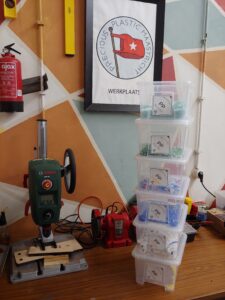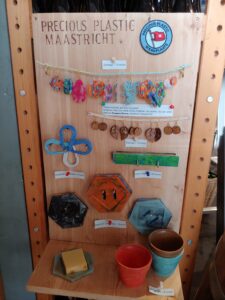
03 jul Precious Plastic Maastricht pakt het plastic dilemma lokaal aan
Stichting Precious Plastic Maastricht (PPM) pakt plasticvervuiling met creativiteit aan. Hun locatie in Maastricht is geïnspireerd door de wereldwijde Precious Plastic-beweging en hun gezamenlijke visie is om een stedelijk plastic recyclingsysteem te creëren. Dit doen ze door (a) het bewustzijn over plasticvervuiling te vergroten door middel van educatie en (b) producten te maken van post-consumer plastic. Wat is hun geheim, hoe doen ze het en waarom is het belangrijk? Over precies deze vragen sprak Claire met de productiemanager van PPM, Ion.
Precious Plastic Maastricht wordt ondersteund door buurtcentra, zoals de UM Sustainability Hub (campus Tapijnkazerne). Hier recyclen en maken ze producten van plastic met machines die ze zelf hebben gemaakt. Ze krijgen plastic van verschillende bedrijven, universiteiten, maar ook mensen die plastic brengen. Denk aan shampooflessen en Chinese afhaalcontainers, deze zijn perfect om te recyclen! Maar is het niet veel werk om schoon te maken? Het is! Om manieren te vinden om gereinigde kunststoffen te leveren, denkt PPM goed na en werkt samen met haar partners.
Ion vertelt Claire “het plastic is er in verschillende maten en vormen. Om een nieuw product te maken, moet het plastic eerst gesorteerd worden op plastic categorie (PP,HDPE…), eventueel worden gewassen en in kleine vlokken versnipperd. De vlokken worden vervolgens gesmolten (190-220°C) en met behulp van een injectie- of extrusiemachine in een mal gestoken. De extrusiemachine heeft min of meer hetzelfde werkingsprincipe als de injectiemachine, alleen het verschil is dat er een constante output is. Je kunt er meer vlokken in doen en ze worden constant gesmolten zodat je bijvoorbeeld zoiets als een draad krijgt”.
 De machines die ze hebben zijn gemaakt dóór en vóór de lokale gemeenschap. Dit zijn kleinschalige machines die vooral handig zijn voor kunstenaars en ontwerpers die een klein productidee hebben en dit in de praktijk willen testen.
De machines die ze hebben zijn gemaakt dóór en vóór de lokale gemeenschap. Dit zijn kleinschalige machines die vooral handig zijn voor kunstenaars en ontwerpers die een klein productidee hebben en dit in de praktijk willen testen.
Meer (verschillende) machines betekent ook een grotere productiecapaciteit, daarom werken ze aan het maken van een hittepers, omdat plastic platen kunnen worden gebruikt voor meubels of grotere producten. Volgens de Precious Plastic-methodologie assembleerden ze nieuwe en oude componenten tot een hittepers, ze gebruikten zelfs een oude oven, zoals Ion benadrukt: “We proberen materialen te hergebruiken en hulpbronnen zo lang mogelijk in de omloop te houden”.
Ze werken er nu aan om hun impact constant te vergroten. “De huidige machines die we hebben zijn helemaal geschikt om de basisprincipes van recycling, (inclusief) machinebouw en prototyping te leren. We werken daarbij ook aan het verbeteren van onze productiecapaciteit, omdat de vraag naar onze producten steeds toeneemt”. De producten die ze verkopen komen in kleine batches (20-100 stuks). Ze kunnen sleutelhangers, oorbellen, linialen, decoratieve tegels, zeepbakjes en kleine bloempotten maken.

De projecten van Precious Plastic zijn duurzaam doordat ze de lokale circulaire economie stimuleren: ze creëren een steeds grotere impact op het publieke bewustzijn. Het is tegelijkertijd ook reclame voor de ethische behandeling van hulpbronnen (plastic) en bekendheid voor hun naam.
Op dit moment worden de producten alleen bij Gedeelde Weelde verkocht. PPM is begonnen met het inzamelen van plastic bij GW, en dit leidde natuurlijk tot een zakelijke kans voor beiden. Ion voegt eraan toe dat ze zagen dat Gedeelde Weelde zeep verkocht, en dat ze de mogelijkheid hadden om een zeepbakje te maken en dat in de winkel te zetten. Bovendien zegt Ion tegen Claire: “Wij verkopen ook andere producten zoals plastic oorbellen, sleutelhangers, bloempotten, linialen”. Je kunt deze producten links naast de wijn vinden in Gedeelde Weelde.

Waar mogelijk staan zij ook op lokale evenementen, zoals bijvoorbeeld de duurzame kerstmarkt in het Landbouwbelang. Daarnaast organiseren zij zelf workshops. Dit vereist veel werk, maar het is belangrijk dat “mensen naar onze werkplek kunnen komen en zien wat we doen en hoe we producten kunnen maken van plastic afval”.
PPM is gebaseerd op vrijwilligers, zij hebben PPM ontwikkeld met vrijwilligersverenigingen, zoals het Werkhuis. Ze zetten zich graag in om verbindingen te creëren en werk te bieden in de samenleving en zijn daarom ook in gesprek met andere verenigingen. “Meer samenwerkingen betekent ook meer mensen die de missie van PPM kunnen uitvoeren, en dat is echt nodig, want PPM is een community-gedreven stichting”, zegt Ion.
Iedereen kan lid worden – ze hebben ook enkele vacatures die ze op hun sociale media plaatsen.
Als je meer wilt weten over hoe Precious Plastic Maastricht plastic omtovert in een product, kun je een afspraak inplannen om de werkruimte te bezoeken.
Neem hiervoor contact op per mail via: info@preciousplasticmaastricht.nl
Zie preciousplasticmaas op Instagram voor hun portfolio.
——————————————————————————————————————————————————
The Precious Plastic Maastricht Foundation (PPM) is tackling plastic pollution with creativity. Their Maastricht location is inspired by the global Precious Plastic movement, and their collective vision is to create an urban plastic recycling system. They do this by (a) raising awareness about plastic pollution through education and (b) making products from post-consumer plastic. What’s their secret, how do they do it, and why does it matter? Claire spoke with PPM’s production manager, Ion, about precisely these questions.
Precious Plastic Maastricht is supported by community centers, such as the UM Sustainability Hub (Tapijnkazerne campus). Here, they recycle and make products out of plastic with machines they have made themselves. They supply their plastic from different companies, universities, but also people who just bring them plastic. Think about shampoo bottles and Chinese take-out containers, these are perfect for recycling! But isn’t it a lot of work to clean? It is! To find ways to supply cleaned plastics PPM carefully considers and cooperates with its partners.
Ion tells Claire “the plastic comes in different forms and shapes. To make a new product, the plastic first needs to be sorted based on plastic category (PP,HDPE…), washed if necessary and shredded into small flakes. The flakes are then melted (190-220°C) and inserted into a mould using an injection or extrusion machine. The extrusion machine has more or less the same principle of working as injection, the difference is that there is a continuous output. You can put more flakes in it and they are melted constantly so you get something like a wire for example”.
The machines they have are made by and for the local community. These are small scale machines which are particularly advantageous for artists and designers who have a product idea and want to test it in practice.
The diversification of their machinery expands their manufacturing ability, that’s why they are working on making a heat press, because sheets of plastic can be used for furniture or larger products. Following the Precious Plastic methodology, they reassembled new and old components into a heat-press, they even used an old oven, as Ion emphasized, “We try to reuse materials and keep resources in the loop as long as possible”.
They are working now to steadily increase their impact. “The current machines we have are excellent for learning the basics of recycling, (including) machine building and prototyping. We are also working on improving our production capability as we noticed demand for our products”. The products they sell come in small batches (20-100 pieces). They can make key-chains, earrings, rulers, decorative tiles, soap dishes, and small flower pots.
Precious Plastic’s projects are achieving sustainability by stimulating the local circular economy: An increasingly significant impact on the public awareness. It is simultaneously an advertisement for the ethical treatment of resources (plastic) and branding for their name.
At the moment, the products are only sold at Gedeelde Weelde. PPM started collecting plastic at GW, and this naturally led to a business opportunity for both of them. Ion adds that they saw that Gedeelde Weelde was selling soap, and they had an opportunity to make a soap dish and put it in the shop. Additionally, Ion tells Claire, “[We] are selling products like plastic earrings, key chains, flower pots, rulers”.
You can find the products on the left next to the wine.
When possible, they present themselves at public events, like the sustainable Christmas market held in the Landbouwbelang, and organize workshops themselves. This requires a lot of work, but it’s important that “people can come to our workplace and see what we are doing, and how to make products from plastic waste”.
PPM is based on volunteers, they have developed PPM with trustworthy volunteer associations, like ‘het Werkhuis’. They collaborate to provide communities with meaningful connection and work, and are therefore discussing collaborations with other associations, too. Such collaboration could add a new network of people who are interested and willing to carrying forth PPM’s mission. That’s really necessary, because PPM is a community-driven foundation. Everyone can become a member – they also have some vacancies that they post on their social media.
If you want to learn more about how Precious Plastic Maastricht turns plastic into a product, you can schedule a visitation their workspace.
Please contact info@preciousplasticmaastricht.nl,
See preciousplasticmaas on Instagram for their portfolio.


